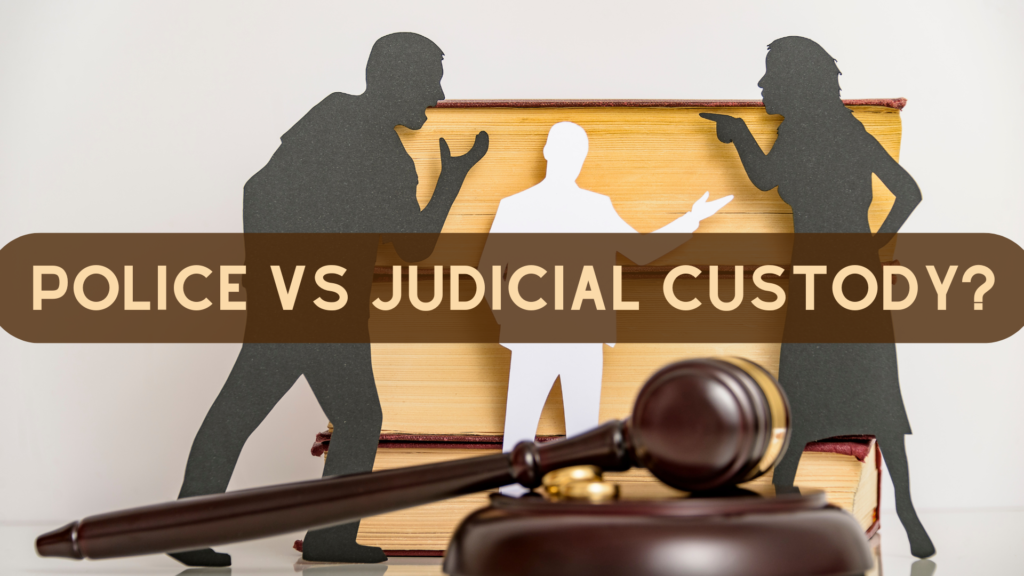🚔 Police Custody vs Judicial Custody – What’s the Difference?
📝 Introduction
In India, when a person is arrested, they may be placed in police custody or judicial custody.
While both involve loss of freedom, the purpose, location, and authority are very different. Knowing these differences is vital to protecting your legal rights and understanding the criminal justice process.
📌 What is Police Custody?
Police custody means that the accused is kept under the supervision of the police, usually in a lock-up at the police station.
- Purpose: To allow police to question and investigate the accused directly.
- Duration: Maximum 24 hours, extendable up to 15 days by a magistrate under Section 167 of CrPC.
- Control: The police are in charge, but under judicial oversight.
📌 What is Judicial Custody?
Judicial custody means the accused is sent to jail (prison) and kept under the supervision of the judiciary.
- Purpose: To prevent interference in investigation and ensure the accused does not tamper with evidence.
- Duration: Can extend beyond 15 days, depending on the stage of investigation and trial.
- Control: The court decides whether the accused remains in jail or is released on bail.
🔍 Key Differences Between Police Custody and Judicial Custody
| Factor | Police Custody | Judicial Custody |
|---|---|---|
| Where kept | Police lock-up | Jail / prison |
| Who controls | Police | Judiciary |
| Purpose | Interrogation | Prevent evidence tampering & ensure trial presence |
| Duration | Up to 15 days | Can be longer, as per court order |
| Bail options | Possible | Possible |
⚖️ Rights of the Accused in Custody
Whether in police or judicial custody, you have:
- Right to legal representation – You can contact your lawyer at any time.
- Right to medical examination – Especially if alleging torture.
- Right to remain silent – You cannot be forced to confess.
- Right to be produced before a magistrate within 24 hours – Mandatory under law.
🛠 Role of a Lawyer in Custody Cases
An experienced Aligarh criminal lawyer can:
- Apply for bail at the earliest stage.
- Ensure police follow due process during interrogation.
- Protect you from unlawful detention or torture.
- Advise on anticipatory bail to avoid custody altogether.
❓ FAQs
1. Can police custody be extended beyond 15 days?
No, police custody cannot exceed 15 days, but after that, the accused can be moved to judicial custody.
2. Can a person get bail in judicial custody?
Yes, the court may grant bail depending on the case facts and legal grounds.
3. Which is harsher – police custody or judicial custody?
Police custody is considered more intense due to active interrogation, while judicial custody involves staying in prison.
4. Can I refuse to answer police questions in custody?
Yes, you have the right to remain silent and cannot be forced to confess.
🏁 Final Thoughts
The difference between police custody and judicial custody is not just about where a person is kept — it’s about who controls the detention and why.
If you or someone you know is facing arrest in Aligarh, contacting an experienced Aligarh criminal lawyer can ensure your rights are protected from the moment of detention.
How I Can Help
With over three decades of legal experience, I have represented individuals across various legal matters, ensuring justice and the best possible outcomes. Every case is unique, and I approach each one with personalized strategies to protect my client’s rights.
Need Legal Assistance? Let’s Talk.
If you have a legal issue or need expert advice, don’t wait. Contact me today to discuss your case and explore the best legal solutions.📞 Call Now: +91-7520404411
📍 Visit My Office: Chamber 7, in front of CJM Court, Aligarh, Uttar Pradesh 202001
